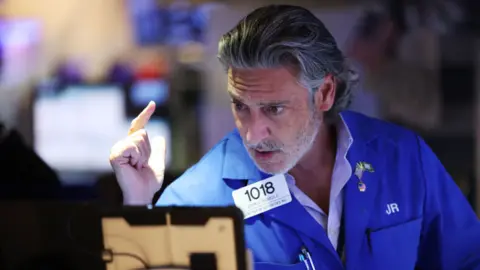US stock markets rise after days of turmoil
 Getty Images
Getty ImagesUS shares opened higher on Tuesday as an uneasy calm returned to global markets after days of sharp falls.
The technology-heavy Nasdaq, the Dow Jones Industrial Average and the S&P 500 all closed higher.
It followed subdued trading in the UK and Europe with London's FTSE 100 initially rising before falling back.
In Japan, the Nikkei 225 stock index jumped by 10.2%, or 3,217 points in its biggest one-day gain in points, after the previous day's plummet.
The stock market rout began on Friday following disappointing US employment figures for July which showed that the jobless rate rose, sparking fears of a recession.
There has also been concern that shares in big technology companies - particularly those investing heavily in artificial intelligence (AI) - have been overvalued and some of those firms now face difficulties.
The volatility intensified on Monday, spreading to Europe and Asia where Japan's Nikkei 225 slumped by 12%.
But by the end of Tuesday the global picture looked more positive:
- The Nasdaq, which had experienced the most turmoil in recent days, closed 1% higher
- The S&P 500 rose by 1% and the Dow Jones was 0.8% higher
- In London, the FTSE 100 closed 0.2% higher while Germany's Dax ended flat and the French Cac 40 lost 0.3%
- As well as Japan, stock markets in South Korea and Taiwan also regained ground, rising around 3.5% after record falls.
"Markets were hit by a perfect storm over the weekend, with numerous factors combining to spook investors," said Rachel Winter, partner at investors Killik & Co.
She added that nerves about the US election had also contributed to the volatility, as "markets detest uncertainty".
'Markets likely to stay volatile'
Economists are divided over the outlook for the US economy, with a number cautioning that it is premature to suggest the world's largest economy is heading for a downturn.
If it does, however, it would have wider implications.
"What happens in the US economically and financially does not stay in the US," said economist Mohamed El-Erian, who is also president of Queens' College, Cambridge.
"The US has been the major driver of global economic growth, the US consumer is a very important engine of economic activity so the world as a whole would suffer if the US were to go into recession."
Fears of recession have renewed calls for the US Federal Reserve to cut interest rates at its next meeting in September in a bid to boost growth.
Last week, the Fed voted to hold rates in the range of 5.25%-5.5% - the highest for two decades - while other central banks decided to cut them.
Some experts say that was a mistake and that stock markets are likely to remain unsettled as a result.
“Markets are very volatile at the moment and will likely stay volatile until the Fed decision in September, so we wouldn't rule out rapid swings in both directions,” said Stefan Angrick, a senior economist with Moody's Analytics.
'Japan’s fundamentals are strong'
The sharp fall in Japanese stocks on Monday was driven in part by issues facing the country's economy.
Japan's currency, the yen, has been strengthening against the US dollar since the Bank of Japan raised interest rates last week. It has made stocks in Tokyo - and Japanese goods in general - more expensive for foreign investors and buyers.
At the same time inflation in Japan rose by more than expected in June while the economy shrank in the first three months of the year.
Commenting on the country's outlook, Jesper Koll, executive director of Monex Group Japan, said he still had confidence in the country.
"Japan’s fundamentals are strong, recession risks are nil and corporate leaders are dead-set on raising capital returns," he told the BBC.
